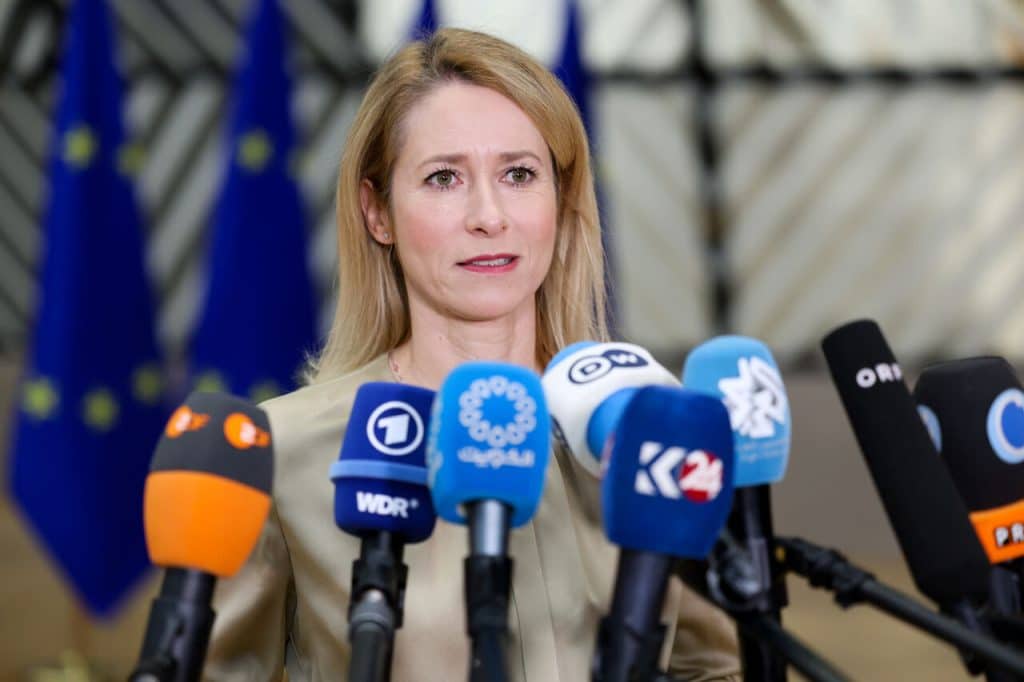Callas: Ukraine/Europe support needed for Trump’s peace plan.
On Thursday, on the eve of the EU Council of Foreign Ministers meeting in Brussels, Kaia Kallas said, referring to the news published about the US “28-point plan” to end the war in Ukraine: “What we Europeans have always supported is a lasting and just peace, and we welcome any effort to achieve such a peace; but for any plan to work, Ukrainians and Europeans must be on board with it.”
Speaking to reporters, she claimed that there is “an aggressor and a victim” in the current war, adding: “We have not heard any news of concessions from the Russian side so far. If Russia really wanted peace, it could have agreed to an unconditional ceasefire some time ago, while we were still witnessing the bombing of civilians last night.” According to her, “93 percent of Russia’s targets were civilian infrastructure, including schools, hospitals and residential buildings.”
Asked about the US president’s ability to stop the war in Ukraine, Kallas said: “To end this war, the Ukrainians and the Europeans must agree to those plans. Putin can end the war right now, if only he stops bombing civilians and killing people.” He claimed that the EU “welcomes all meaningful efforts to end the war,” but that the peace must be “just and sustainable” and agreed to by “the Ukrainians as well as the Europeans.”
Asked whether Brussels had been involved in drafting a new peace plan between the US and Russia, the EU foreign policy chief said: “As far as I know, no.” The comments came as Western media, citing US and Russian officials, reported that Washington was in close consultation with Moscow on a multi-sectoral roadmap that would simultaneously address peace in Ukraine, European security, and the future of US relations with Moscow and Kiev.
Elsewhere in her remarks, Kallas referred to the EU foreign ministers’ broad agenda, saying that ministers were to discuss new ways to counter Russia’s “shadow fleet” of energy carriers, a network of ships that European officials say are used to circumvent oil sanctions and reduce oversight of Russian energy trade. She claimed that measures in this area “have a direct impact on Russia’s revenues to finance the war,” although a significant portion of the meeting was devoted to recent political and diplomatic developments.
Callas also touched on another part of the foreign ministers’ agenda related to the Middle East and Gaza, and referring to the recent adoption of a UN Security Council resolution on a ceasefire and new arrangements in the Gaza Strip, he said that the EU is considering changing the mission of two of its missions: the “European Union Border Mission at the Rafah Crossing” and the “EU Police Mission (EUPOL COPPS), whose mission is to train Palestinian police. According to him, these two missions are intended as part of the post-war peace and border management master plan.
In response to a question about the EU’s program to train Palestinian forces, the European official explained: “The plan is to train 3,000 Palestinian police forces to take over border security and do the same thing that police do in any country.” Recalling Brussels’ support for the so-called two-state solution, he added: “When we talk about two states, it means that the Palestinians must also be the ones who lead and own the processes taking place in Palestine. We can only help them build trust and train the police forces.” At the same time, Kallas added that the implementation of this program requires “more resources from member states and more experts to be sent to these missions.”
Kallas also pointed out that the ceasefire in Gaza is fragile and said that the current focus of the European Union is on maintaining the ceasefire and “building a sustainable peace based on it.” At the same time, he clarified that “accountability for all crimes committed is also part of a just and sustainable peace.”
This is while the Israeli regime’s air and artillery attacks on various areas of Gaza continue despite the ceasefire agreement, and numerous reports have been published of repeated violations of this agreement. Palestinian sources say that since the ceasefire began, hundreds of other Palestinians have been martyred in sporadic attacks and shooting by the Zionist military, and in recent days alone, several people have been killed in new attacks and direct fire in various parts of Gaza.
According to statistics from the Gaza Ministry of Health, which is also cited as a reference by international organizations, the number of martyrs in the war since October 2023 has reached about 69,000, and more than 170,000 people have been injured.

